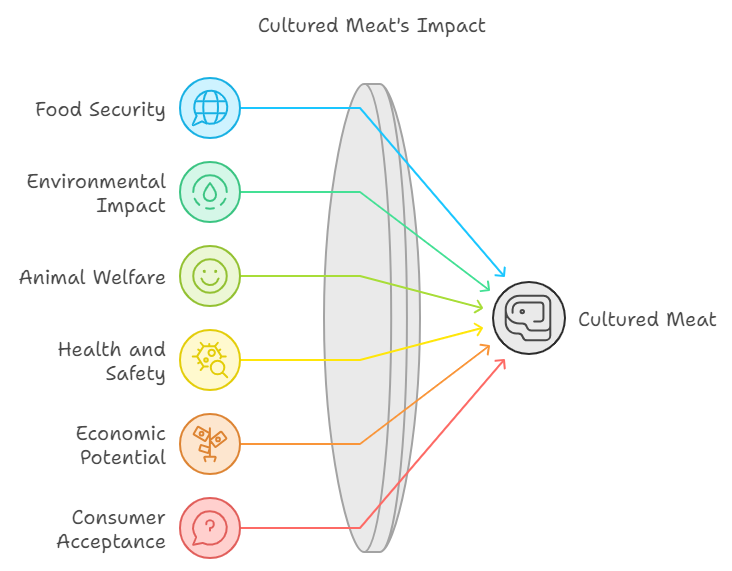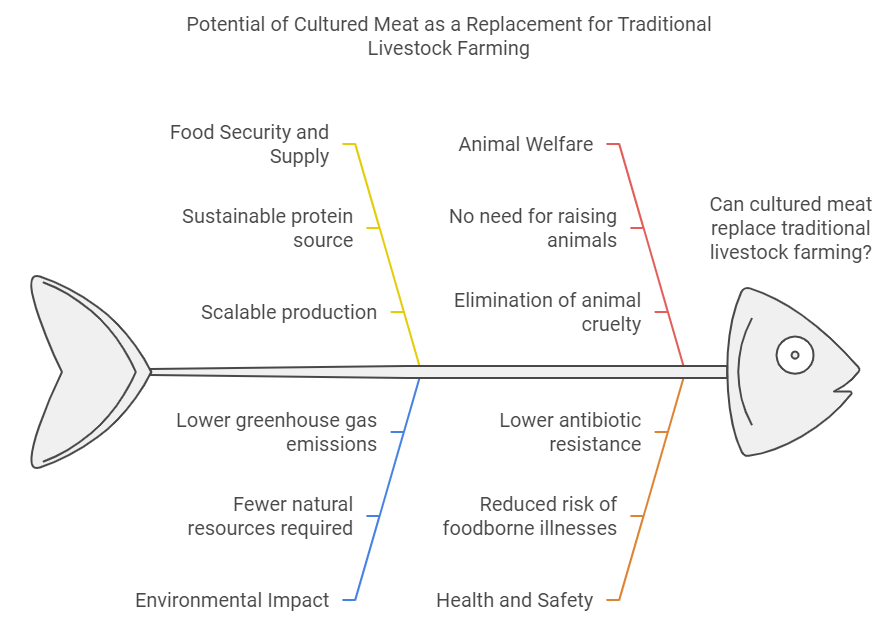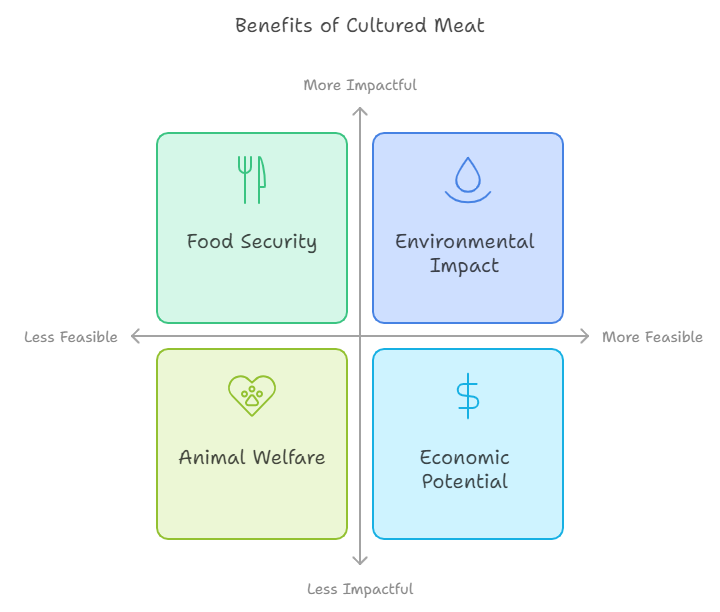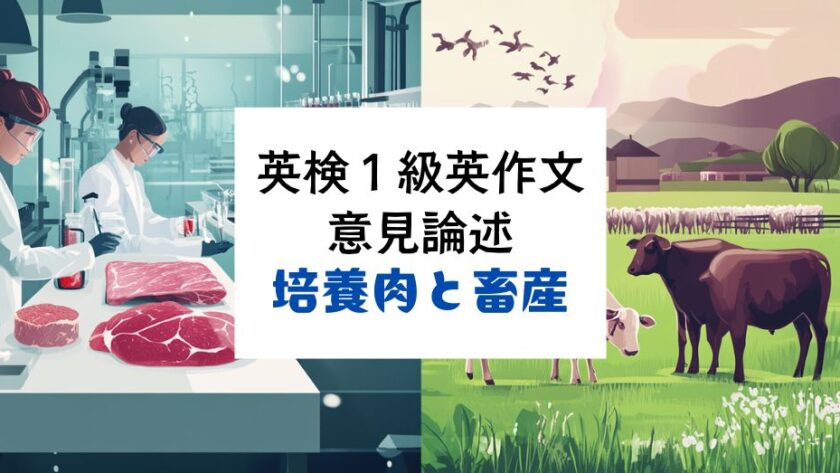(簡単★~難しい★★★★★)語彙難易度★★

目次
Question: Can cultured meat replace traditional livestock farming?
培養肉は従来の畜産に取って代わることができるでしょうか?
トレーニング手順
200~240語程度、3つの観点、目標解答時間:約25分
- 分野・トピック毎の観点とキーワードをまとめる
以下の画像のようなイメージ図にしておくと、記憶に定着するのでおススメ - 自分が書きやすい立場・観点で実際に書く
分からない表現はすぐに調べて15分程度で書く - 続いて、先ほどとは反対意見で書いてみる
分からない表現はすぐに調べて15分程度で書く - そのトピックについて実際に誰かと話す、又は1分スピーチをする
- 同じ分野で3つくらいの意見論述を作成する
例えば、宇宙なら宇宙植民・宇宙採掘・宇宙旅行など
6つの観点 (Perspectives)
単純化したイラストで整理することで、記憶に定着しやすくなります。

観点 (Perspectives)
- Food Security and Supply (食料安全保障と供給)
- Cultured meat offers a potential solution to global food shortages by providing a sustainable and scalable source of protein.
- Environmental Impact (環境への影響)
- Cultured meat production requires fewer natural resources, such as water and land, and generates fewer greenhouse gas emissions compared to traditional livestock farming.
- Animal Welfare (動物福祉)
- Cultured meat eliminates the need for raising and slaughtering animals, addressing ethical concerns related to animal cruelty and industrial farming.
- Health and Safety (健康と安全)
- Cultured meat can be produced in controlled environments, potentially reducing the risk of foodborne illnesses, antibiotic resistance, and contamination found in conventional meat production.
- Economic Considerations and Market Potential (経済的な考慮事項と市場の可能性)
- While the technology is still developing, cultured meat could become a major industry, attracting investments and creating new job opportunities in biotechnology and food science.
- Consumer Acceptance and Cultural Preferences (消費者の受容と文化的嗜好)
- One challenge is overcoming consumer skepticism and cultural preferences for traditional meat, which could slow the adoption of cultured meat.
キーワード (Keywords)
- cultured meat (培養肉)
- food sustainability (食料の持続可能性)
- animal welfare (動物福祉)
- greenhouse gas emissions (温室効果ガス排出)
- resource efficiency (資源効率)
- food safety (食品安全)
- protein alternatives (代替タンパク質)
- ethical consumption (倫理的消費)
- biotechnology (バイオテクノロジー)
- consumer perception (消費者の認識)
使われそうな動詞 (Verbs)
- cultivate (培養する)
- innovate (革新する)
- reduce (減らす)
- address (対処する)
- replace (置き換える)
- optimize (最適化する)
- produce (生産する)
- invest (投資する)
- adopt (採用する)
- mitigate (軽減する)
使われそうな形容詞 (Adjectives)
- sustainable (持続可能な)
- ethical (倫理的な)
- resource-efficient (資源効率の高い)
- lab-grown (培養された)
- scalable (スケーラブルな)
- innovative (革新的な)
- environmentally friendly (環境に優しい)
- cruelty-free (残虐行為のない)
- nutritious (栄養価の高い)
- hygienic (衛生的な)
使われそうな副詞 (Adverbs)
- sustainably (持続可能に)
- ethically (倫理的に)
- efficiently (効率的に)
- economically (経済的に)
- environmentally (環境的に)
- hygienically (衛生的に)
- innovatively (革新的に)
- globally (世界的に)
- progressively (段階的に)
- responsibly (責任を持って)

Yes: 培養肉は畜産に取って代わる
Cultured meat has the potential to replace traditional livestock farming, offering benefits for food security, environmental sustainability, and animal welfare. As the world faces growing challenges in these areas, cultured meat could be a viable solution.
First, cultured meat can enhance global food security by providing a sustainable and scalable source of protein. Traditional livestock farming requires vast amounts of land, water, and feed, limiting its ability to meet the rising demand for food. Cultured meat, however, can be produced efficiently in controlled environments, making it a more effective way to address potential food shortages.
Second, the environmental impact of cultured meat is far lower than that of conventional livestock farming. Livestock farming is a major contributor to greenhouse gas emissions, deforestation, and water use. In contrast, cultured meat production consumes fewer natural resources and generates fewer emissions. This shift could play a key role in mitigating climate change and conserving the planet’s resources.
Finally, cultured meat addresses ethical concerns related to animal welfare. The production process does not involve raising or slaughtering animals, reducing issues of animal cruelty and poor living conditions in industrial farming. This appeals to consumers who are increasingly concerned about the ethics of their food.
In conclusion, cultured meat offers a promising alternative to traditional livestock farming. It can improve food security, reduce environmental impact, and address ethical concerns, making it a valuable solution for the future of food production. (237 words)
賛成意見の訳と用語
Cultured meat has the potential to replace traditional livestock farming, offering benefits for food security, environmental sustainability, and animal welfare. As the world faces growing challenges in these areas, cultured meat could be a viable solution.
イントロ: 培養肉の可能性とその利点
培養肉は、食料安全保障、環境の持続可能性、動物福祉に対する恩恵を提供し、従来の家畜農業に取って代わる可能性を秘めている。世界がこれらの分野で直面する課題が増大する中、培養肉は有効な解決策となるかもしれない。
- “has the potential to”(~の可能性がある)
類語: “has the capacity to,” “is capable of”
反語: “lacks the potential to,” “is unlikely to” - “replace”(取って代わる)
類語: “supersede,” “substitute for”
反語: “maintain,” “preserve” - “offering benefits”(恩恵を提供する)
類語: “providing advantages,” “granting benefits”
反語: “causing drawbacks,” “leading to disadvantages” - “viable solution”(実行可能な解決策)
類語: “feasible solution,” “workable remedy”
反語: “impractical solution,” “unviable option”
First, cultured meat can enhance global food security by providing a sustainable and scalable source of protein. Traditional livestock farming requires vast amounts of land, water, and feed, limiting its ability to meet the rising demand for food. Cultured meat, however, can be produced efficiently in controlled environments, making it a more effective way to address potential food shortages.
ボディ1: 食料安全保障の強化
まず、培養肉は持続可能かつスケーラブルなタンパク質源を提供することで、世界の食料安全保障を強化できる。従来の家畜農業は広大な土地、水、飼料を必要とし、食料需要の増加に対応する能力が限られている。一方、培養肉は管理された環境で効率的に生産でき、将来の食糧不足に対応するための効果的な手段となる。
- “cultured meat”(培養肉)
類語: “lab-grown meat,” “cell-based meat”
反語: “traditional meat,” “conventional meat” - “food security”(食料安全保障)
類語: “food stability,” “nutritional security”
反語: “food insecurity,” “hunger crisis” - “sustainable and scalable”(持続可能で拡張可能な)
類語: “environmentally viable and expandable”
反語: “unsustainable and limited”
Second, the environmental impact of cultured meat is far lower than that of conventional livestock farming. Livestock farming is a major contributor to greenhouse gas emissions, deforestation, and water use. In contrast, cultured meat production consumes fewer natural resources and generates fewer emissions. This shift could play a key role in mitigating climate change and conserving the planet’s resources.
ボディ2: 環境への影響の軽減
次に、培養肉の環境への影響は従来の家畜農業に比べてはるかに低い。家畜農業は温室効果ガス排出や森林破壊、水資源の大量消費に大きく寄与している。それに対し、培養肉の生産は天然資源の消費を抑え、排出量も少ない。この変化は、気候変動の緩和や地球資源の保全において重要な役割を果たす可能性がある。
- “environmental impact”(環境への影響)
類語: “ecological footprint,” “environmental consequences”
反語: “no impact,” “minimal footprint” - “livestock farming”(家畜農業)
類語: “animal agriculture,” “cattle farming”
反語: “plant-based farming,” “crop agriculture” - “greenhouse gas emissions”(温室効果ガスの排出)
類語: “carbon emissions,” “CO2 output”
反語: “carbon sequestration,” “carbon reduction” - “mitigating climate change”(気候変動の緩和)
類語: “alleviating global warming,” “reducing climate impact”
反語: “worsening climate change,” “exacerbating global warming”
Finally, cultured meat addresses ethical concerns related to animal welfare. The production process does not involve raising or slaughtering animals, reducing issues of animal cruelty and poor living conditions in industrial farming. This appeals to consumers who are increasingly concerned about the ethics of their food.
ボディ3: 動物福祉の改善
最後に、培養肉は動物福祉に関連する倫理的懸念にも対応している。培養肉の生産過程では、動物を育てたり屠殺したりする必要がないため、動物虐待や劣悪な飼育環境に関する問題が軽減される。これは、食の倫理に関心を持つ消費者にとって魅力的な選択肢となる。
- “ethical concerns”(倫理的懸念)
類語: “moral issues,” “ethical dilemmas”
反語: “ethical clarity,” “moral certainty” - “animal welfare”(動物福祉)
類語: “animal rights,” “humane treatment of animals”
反語: “animal cruelty,” “inhumane treatment” - “industrial farming”(工業型農業)
類語: “factory farming,” “mass-scale farming”
反語: “organic farming,” “sustainable agriculture”
In conclusion, cultured meat offers a promising alternative to traditional livestock farming. It can improve food security, reduce environmental impact, and address ethical concerns, making it a valuable solution for the future of food production. (237 words)
結論: 食肉生産の未来としての培養肉
結論として、培養肉は従来の家畜農業に代わる有望な選択肢である。食料安全保障の改善、環境への影響の軽減、倫理的懸念の解消に寄与することで、未来の食糧生産において重要な解決策となり得る。
- “promising alternative”(有望な代替案)
類語: “hopeful substitute,” “viable option”
反語: “unpromising option,” “unsatisfactory alternative” - “address ethical concerns”(倫理的懸念に対処する)
類語: “tackle ethical issues,” “resolve moral concerns”
反語: “ignore ethical concerns,” “disregard moral issues” - “valuable solution”(価値ある解決策)
類語: “important remedy,” “crucial resolution”
反語: “worthless solution,” “ineffective remedy”

No: 培養肉は畜産に取って代わらないい
While cultured meat presents potential benefits, it is unlikely to fully replace traditional livestock farming. Issues related to consumer acceptance, economic viability, and food security challenges make it difficult for cultured meat to dominate the market.
First, consumer acceptance and cultural preferences pose significant barriers. Many people are skeptical of lab-grown food and have strong preferences for traditional meat. Cultural factors, such as the association of meat with certain culinary traditions and social events, could slow the adoption of cultured meat. Changing long-standing eating habits will require significant time and effort.
Second, the economic viability of cultured meat remains uncertain. Despite advances in technology, cultured meat is still expensive to produce at scale. The high costs of production, along with the need for large investments in infrastructure and research, make it difficult for cultured meat to compete with traditional meat in the near future. It may be years before it becomes affordable for average consumers.
Finally, cultured meat may not fully address food security. While it offers a potential solution, producing it on a global scale requires significant energy and technological resources. Countries without access to these resources may struggle to benefit from cultured meat, limiting its global impact on food supply.
In conclusion, while cultured meat offers potential advantages, challenges in consumer acceptance, economic feasibility, and food security suggest that traditional livestock farming will remain essential for the foreseeable future. (231 words)
反対意見の訳と用語
While cultured meat presents potential benefits, it is unlikely to fully replace traditional livestock farming. Issues related to consumer acceptance, economic viability, and food security challenges make it difficult for cultured meat to dominate the market.
イントロ:培養肉が家畜農業に完全に取って代わる可能性の低さ
培養肉には潜在的な利点があるものの、従来の家畜農業を完全に置き換えることは難しいだろう。消費者の受け入れ、経済的な実現性、そして食料安全保障に関する課題が、培養肉が市場を支配するのを困難にしている。
- “presents potential benefits”(潜在的な利点を提供する)
類語: “offers potential advantages,” “provides possible benefits”
反語: “presents no benefits,” “lacks potential benefits” - “unlikely to fully replace”(完全に取って代わる可能性は低い)
類語: “improbable to entirely replace,” “doubtful to completely substitute”
反語: “likely to replace,” “probable to replace” - “dominate the market”(市場を支配する)
類語: “control the market,” “lead the industry”
反語: “lose market share,” “fail to dominate”
First, consumer acceptance and cultural preferences pose significant barriers. Many people are skeptical of lab-grown food and have strong preferences for traditional meat. Cultural factors, such as the association of meat with certain culinary traditions and social events, could slow the adoption of cultured meat. Changing long-standing eating habits will require significant time and effort.
ボディ1:消費者の受け入れと文化的嗜好
まず、消費者の受け入れと文化的嗜好が大きな障害となっている。多くの人々は培養された食品に対して懐疑的であり、伝統的な肉に対する強い嗜好を持っている。肉が特定の料理の伝統や社会的なイベントと結びついていることから、文化的要因が培養肉の普及を遅らせる可能性がある。長年にわたって確立された食習慣を変えるには、相当な時間と労力が必要となるだろう。
- “consumer acceptance”(消費者の受け入れ)
類語: “consumer approval,” “customer endorsement”
反語: “consumer rejection,” “customer disapproval” - “significant barriers”(大きな障害)
類語: “major obstacles,” “serious challenges”
反語: “minor hurdles,” “trivial barriers” - “changing long-standing eating habits”(長年の食習慣を変える)
類語: “altering entrenched dietary habits,” “modifying established eating practices”
反語: “maintaining long-standing habits,” “preserving traditional eating patterns”
Second, the economic viability of cultured meat remains uncertain. Despite advances in technology, cultured meat is still expensive to produce at scale. The high costs of production, along with the need for large investments in infrastructure and research, make it difficult for cultured meat to compete with traditional meat in the near future. It may be years before it becomes affordable for average consumers.
ボディ2:経済的実現性の不確実性
次に、培養肉の経済的実現性は依然として不透明である。技術の進歩にもかかわらず、培養肉は大規模に生産するにはまだ高コストである。生産コストが高い上に、インフラや研究への大規模な投資が必要なため、培養肉が近い将来、従来の肉と競争するのは難しいだろう。一般消費者が手に入れやすくなるには、まだ数年かかるかもしれない。
- “economic viability”(経済的実現可能性)
類語: “financial feasibility,” “economic practicality”
反語: “economic infeasibility,” “financial impracticality” - “produce at scale”(大規模に生産する)
類語: “mass-produce,” “produce in large quantities”
反語: “produce in small batches,” “produce on a small scale” - “compete with traditional meat”(従来の肉と競争する)
類語: “vie with traditional meat,” “rival conventional meat”
反語: “cooperate with,” “avoid competing with”
Finally, cultured meat may not fully address food security. While it offers a potential solution, producing it on a global scale requires significant energy and technological resources. Countries without access to these resources may struggle to benefit from cultured meat, limiting its global impact on food supply.
ボディ3:食料安全保障への課題
最後に、培養肉は必ずしも食料安全保障を完全に解決できるわけではない。潜在的な解決策を提供しているものの、世界規模での生産には大量のエネルギーと技術的資源が必要となる。これらの資源を利用できない国々は、培養肉の恩恵を受けるのが難しく、世界的な食料供給に対する影響は限定的となる可能性がある。
- “food security”(食料安全保障)
類語: “food stability,” “nutritional security”
反語: “food insecurity,” “hunger crisis” - “struggle to benefit”(利益を得るのに苦労する)
類語: “find it difficult to benefit,” “have trouble benefiting”
反語: “easily benefit,” “have no trouble benefiting” - “limiting its global impact”(世界的な影響を制限する)
類語: “restricting its worldwide influence,” “curbing its international effect”
反語: “enhancing its global impact,” “amplifying its worldwide influence”
In conclusion, while cultured meat offers potential advantages, challenges in consumer acceptance, economic feasibility, and food security suggest that traditional livestock farming will remain essential for the foreseeable future. (231 words)
結論:伝統的な家畜農業の重要性
結論として、培養肉には潜在的な利点があるものの、消費者の受け入れ、経済的実現可能性、そして食料安全保障の課題を考えると、従来の家畜農業はしばらくの間、不可欠な存在であり続けるだろう。
- “traditional livestock farming will remain essential”(伝統的な家畜農業は不可欠であり続ける)
類語: “will continue to be essential,” “will stay indispensable”
反語: “will become unnecessary,” “will no longer be needed” - “foreseeable future”(近い将来)
類語: “near future,” “immediate future”
反語: “distant future,” “unforeseeable future” - “suggest that”(~であることを示唆する)
類語: “indicate that,” “imply that”
反語: “state clearly,” “deny that”
まとめ
学習振り返りコラム: 培養肉に関する賛成・反対意見の論述
今回のエッセイでは、培養肉が従来の家畜農業に取って代わるべきかというテーマについて、賛成意見と反対意見をそれぞれ比較しました。英検1級の英作文対策として、今回の内容を通して多くの重要な学びが得られたため、その振り返りをまとめます。
賛成意見の要点
賛成意見では、培養肉が提供する食料安全保障の強化、環境への配慮、動物福祉の改善といった利点が強調されました。まず、従来の家畜農業と異なり、培養肉は少ない資源で効率的に生産可能であり、将来の食料不足に対応できる可能性があるとされました。また、環境への負荷が従来の畜産に比べて大幅に低いため、温室効果ガス排出量削減にも貢献すると論じられました。さらに、動物を育てたり屠殺する必要がないため、動物福祉に関する倫理的な問題にも対処できるという主張がありました。
反対意見の要点
一方で、反対意見では、消費者の受け入れ、経済的実現可能性、食料安全保障の課題が指摘されました。培養肉は技術的に進化しているものの、文化的な嗜好や食習慣により消費者の受け入れが遅れる可能性があり、経済的にも現時点では高コストで生産が難しいという懸念が示されています。また、培養肉が世界的に普及するためには大量のエネルギーと技術が必要で、これにアクセスできない国々では培養肉の恩恵が限られるという課題も論じられました。
学習ポイント
今回の賛成・反対の両意見を検討することで、英検1級レベルの英作文において求められる多角的な視点や論理的な展開の重要性を学ぶことができました。
- 多角的な視点の理解
賛成意見では、培養肉の環境や倫理に与えるポジティブな影響に焦点を当て、反対意見では、実現可能性や消費者の文化的背景といった現実的な課題が強調されています。どちらの立場も考慮し、総合的に物事を判断するスキルが必要であることが再確認できました。 - 語彙の拡充
今回のエッセイを通じて、“food security”(食料安全保障)、“economic viability”(経済的実現可能性)、“cultural preferences”(文化的嗜好) といった重要な語彙やフレーズを学びました。これらの語彙は、複雑なテーマに対する深い理解を示すのに役立ち、英作文や意見論述においても有効に使える表現です。 - 文法の使い方
“should be banned”(禁止されるべき) や “is unlikely to replace”(取って代わる可能性は低い) などの表現は、意見を明確に示す際に使われる重要な構造です。意見を強調したり、確信度を示す際の適切な助動詞の使用が、論述の説得力を高めることに繋がります。 - 論理的な展開の構築
各段落が明確なテーマに基づいて論理的に展開されていることから、英検1級のエッセイでは、どのように一貫性のある意見を構築し、各段落を繋げるかが重要であることが学べました。導入部分で論点を提示し、それぞれの段落でサポートする根拠を示し、最後に結論で全体をまとめる構成が効果的であることが再認識できました。
今後の学習に向けて
今回の学習を通じて、意見の明確な展開や語彙・文法の実践的な活用を学ぶことができました。英検1級のライティングにおいては、今回のような多角的な視点を持ち、論理的に一貫した意見を述べることが求められます。今後の学習では、さらに多くのトピックで論述の練習を行い、より強固な意見を構築できるように努めましょう。また、語彙力を強化し、幅広い表現を身につけることで、説得力のあるエッセイが書けるようになることを目指しましょう。
英検1級英作文(意見論述・要約問題)・二次試験(面接)リストはコチラ
英検1級トピック探しにおススメのサイト:Britanica ProCon.org
英作文(意見論述・要約問題)対策テキスト

「どんなテキストがおすすめですか?」とよく聞かれるのですが、「問題量が多い」ものと「知識量を増やせるもの」の2種類を準備すると良いかと思います。
また、あまりにも文法解説が長いテキストは、英検1級対策としては、「?」という感じがします。
「何を、どんな観点で、どう伝えるか」にフォーカスして書かれたテキストを選んでください。
英作文テキストは、「最低でも3ラウンドする」。語彙や表現を増やす系のテキストは「最低でも5ラウンドする」つもりで、1ページごとに時間をかけすぎず、分からない時はすぐにググりながらテンポよく進めていきます。




